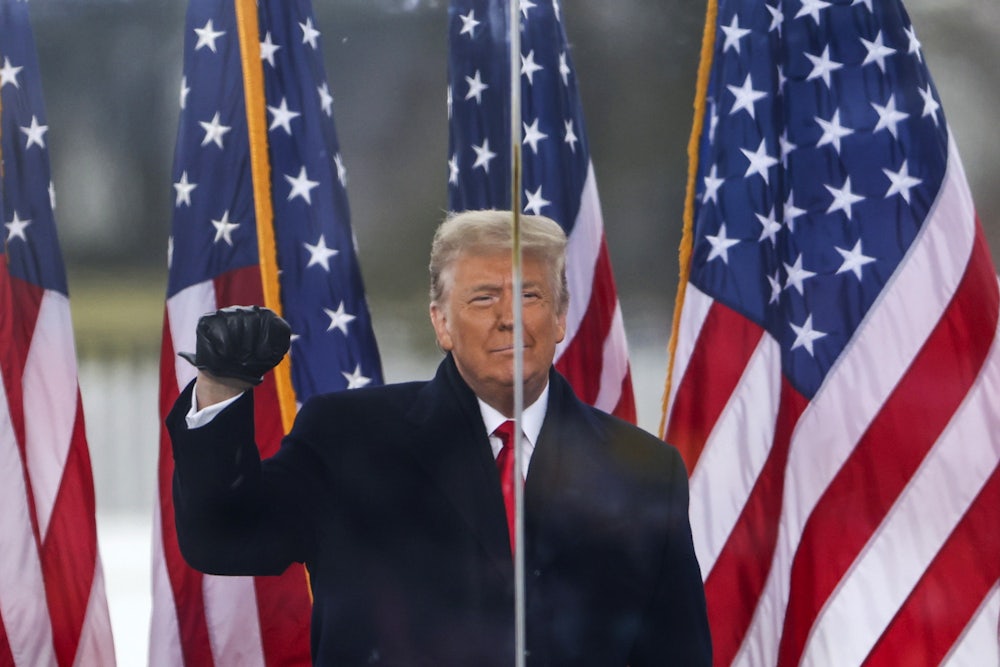“But just remember this: You’re smarter, you’re stronger, you’ve got more going than anybody, and they try and demean everybody having to do with us.”—Donald Trump, January 6, 2021
“We need to be the party of reason.”—Donald Trump Jr., earlier the same day
As the lead institutions of our political life wind down from the horrific spectacle of Wednesday’s abortive MAGA coup, they contemplate restoring order through the familiar and reassuring operations of government oversight. Hence the eleventh-hour bids either to impeach and remove President Donald Trump from office or to invoke the Twenty-Fifth Amendment to transfer the substantive powers of the presidency to Vice President Mike Pence. These measures, we’re almost prayerfully reasoning, would be penalties commensurate with the grave abuse of the office of the presidency in its incitement of a mass assault on the Capitol, undertaken with the intention of compelling Congress to cease certification of the 2020 election results. They would strip a mad president of the power that he so plainly covets, and would presumably discipline a Republican leadership that has, for far too long, prostrated itself before the feckless, unstable fever dreams of the nation’s grievance-addled commander in chief.
These measures, like so much else about the past week, would also be unprecedented: harried efforts to short-circuit the nihilistic and increasingly violent logic of the modern conservative movement. And the particular remedy of impeachment and removal would seek to prevent any nightmare like the Wednesday siege of the Capitol from happening again, by ensuring Donald Trump could never again run for the presidency.
But the big question hanging over our beleaguered, buckling democracy isn’t so much the person of Trump; it’s Trumpism, as a movement of mass right-wing violence. Even in the final days of the Trump presidency, we’re at a loss to supply a compelling account of just how and why something like the long-sanctioned politics of culture-war grievance on the right could have both captured the American presidency and produced a would-be American coup. For the past four years, we’ve undertaken various forensic inquiries into the mindset and psychic makeup of Trump supporters. Are they confrontational apostles of white privilege? Are they misguided casualties of global capitalism’s brutal race to the wage bottom? Are they fascists? Are they crazy? Are they textbook exhibits of social media gone wild?
Of course, in many ways, the answer to all these questions is “yes.” But all the individual pathologies fueling support for Trump have also coalesced around a broader quest for emotional catharsis in politics, a kind of mass therapy-by-confrontation with the specter of illegitimate cultural power. While journalists and social scientists plumbing the emotional appeal of the Trump movement tend to alight on narratives stressing the comparative isolation and stoic suffering of individual Trump supporters bewildered by a world seeming to pass them by, Wednesday’s rally—like the many, many Trump rallies preceding it—showed a tremendous mass outpouring of faith in the redemptive power of grievance, rooted in both the doomed “Stop the Steal” campaign to reverse the election and the near-ceremonial rites of denunciation and excoriation of liberal pomp, pretense, and “suppression.” It’s extremely hard to chart this quasi-spiritual communion of leader and mass following along the traditional lines of our inherited political discourse, but it was on lavish display in the marathon “Save America” rally that led directly to the Capitol siege.
Reviewing the mass gathering that touched off the violent bid to overturn the election results, it’s striking how little salience it had in connection with the actual politics of the election and its aftermath. Instead, the speakers focused on the personal upshot of the crime they believed to be in progress down the street at the Capitol—the silencing of their voices—over against the question of just what might be done on their behalf once the stolen presidency was reclaimed. Perhaps this isn’t so surprising for a Republican Party that adopted a 2020 campaign platform amounting to “whatever Trump wants.” Still, past disputed votes over the presidency created very consequential policy fallout, well understood by the combatants—the suspension of Reconstruction in the infamous 1877 bargain for the presidency, and the restoration of tax-cutting Reaganism in the Bush-Gore battle of 2000. For the Trump speakers, very much by contrast, the combat itself was the thing—the exhilarating sense that, yes, the Trump movement was alive and fighting, and poised to subdue the “weak Republicans” deferring to the certification of the Electoral College results.
Indeed, the most relevant historical forerunner to today’s Stop the Steal folklore isn’t so much those previous episodes but rather Theodore Roosevelt’s eager, didactic embrace of “the martial spirit” at the turn of the twentieth century. Like today’s revolt, Roosevelt’s crusade was premised on the raw assertion of American power for its own sake—in his case, in Panama, Cuba, and other outposts of the emerging American empire. Much like the ardent enablers of Trumpian impunity, Roosevelt endorsed the ethos of American militarism as a therapeutic project—a means of achieving “the moral and intellectual rehabilitation of the ruling class,” as Christopher Lasch put it. Roosevelt’s all-purpose adoption of “the strenuous life” at least produced some beneficial policy outcomes, such as the first great wave of antitrust prosecutions. The Trumpist version, however, begins and ends with the vision of a great leader on the brink of sinister overthrow and martyrdom—whose great love for the scorned nation behind him urgently requires immediate requital and redemption.
These themes were summoned at the “Save America” gathering even before the speakers took to the rostrum. As the broadcast of the event began, Twitter commentators rushed to note the irony that the final song played on the P.A. system before Trumpist cable pundit Katrina Pierson formally kicked off the rally was “My Heart Will Go On”—the treacly Titanic theme song by Hillary Clinton–backing chanteuse Celine Dion. But the song that aired prior to Dion’s waterlogged love ballad was Elton John’s “Saturday Night’s Alright (For Fighting).” The juxtaposition here doubled as the event’s de facto mission statement: The battle was about to be joined, but with a soothing undercurrent of emotional validation, even love.
Pierson herself, in her opening remarks, underlined the relevant therapeutic distinctions here: The roused Trump electorate would assert its sovereignty over the faithless D.C. political class, and would do so in a way that would shame and eclipse the lifeless canons of liberal dissent. “Here’s the deal, guys”—another small but telling tic of the rally’s oratory was that, while half the featured speakers were women, the crowd was always addressed as “guys”—“the left, they go out there, and they scream and cry and they whine. But this is something they don’t get, either: Let me tell you, they haven’t seen a resistance until they have seen a patriot fight for their country! Because we know how to fight for our country, we’re not going to complain, we’re not going to cry in the streets. We’re not going to sit in. You’re going to see us, and you’re going to hear us”—at which point Pierson reeled off the now-familiar litany of disproved voter-fraud charges.
Of course, the substance of Pierson’s tacit claim—we’re the peaceful, play-by-the-rules, grown-up protest faction—was refuted in the ugliest imaginable fashion a few hours later, with five deaths and rampant vandalism and theft amid chants of “Hang Mike Pence!”; with shit smeared on the walls of the Capitol and “Murder the Media” graffiti scrawled on an office door. But this carefully calibrated self-image provides a powerful kind of psychic legitimation for the Trump insurgency: It conjures the urgent mandate of frontal engagement with the powers that be, but in a controlled, civilized fashion. This fanciful image of Trumpist protest recalls and reinforces the founding mythology of the Tea Party, which Pierson helped to launch and organize: the critical notion that movement patriots are ordinary, law-abiding citizens driven to outraged-but-orderly politics of grassroots confrontation by the stunning betrayals of the governing class.
Just as important was Pierson’s characterization of the kind of serious protest that matters to the Trump movement: “You’re going to see us, and you’re going to hear us.” This, too, was a constant refrain from the “Save America” podium: We are many, they are few. The prooftext for Pierson and the other speakers was the crowd itself—a mustering of Trump supporters that echoed the American majority that was marginalized and denied its voice in the election. “We’ve seen these crowds, unlike Joe Biden and his six hula hoops,” Pierson announced. “The guy couldn’t even get 1,000 views online, but we’re supposed to believe that he had more votes than Barack Obama. I mean, nobody really believes this crap.” She wound up her remarks with the same appeal: “I can see from here all the way back: There are more of us than there are of them, and they’re about to see us coming!”
What’s integral to being civically seen in the bizarre context of the “Save America” rally is that the dissenting image the insurrectionists are cultivating is fatally yoked to that of Donald Trump: not only a sitting president exploiting all the counter-patriotic traditions of D.C. self-dealing to the utmost, but also a louche Fauntleroy of the pro-wrestling and reality TV circuit. So Donald Trump, too, is seen in a very peculiar way: as a heroic avatar of patriotic sacrifice in his own right, helping to bring the assembled patriot crowd back in contact with its true governing birthright. This Trump is also, importantly, a fighter, poised to sacrifice all for the sake of his patriot followers. “This president has sacrificed everything for this country and has asked for nothing in return,” Pierson declaimed. “He loves the United States of America. He loves God, he loves our flag, and he loves all of you. And that’s why we’re all here today. We love Trump. I’ve never seen someone fight so hard, so strong against everything, here and abroad, just to provide and protect our basic values to keep our nation free and our people able to go to church.”
Here is that Gilded Age martial spirit retrofitted for our own therapeutic moment: Trump is “so hard, so strong,” but also a vessel of a higher love; Saturday Night’s Alright for Fighting and My Heart Will Go On. The quasi-messianic notion that Trump fights for us all and asks for nothing in return also helped the rally speakers articulate the crowd’s end of the bargain: Now the loving great leader needs us to fight for him. Amy Cramer, founder of Women for America First, the group that organized the rally, wasted no time in taking up this theme. Trump’s heroic sacrifice is a mass call to arms, she explained—but also a prophetic warning for the pusillanimous right-wing political class to stand up and fight themselves, on Trump’s behalf:
The president has not asked for much, but he asked for us to show up today, and we showed up. And we are not going to back down, we’re not going to go away. You see, Republicans for years have been afraid of their own shadows. They tuck tail and run anytime they see their shadows. If nothing else, what Republicans should have learned was how to go on offense and win, and fight back—punch back—from Donald Trump. He doesn’t back down; he’s not afraid of Republicans, he’s not afraid of Democrats. He doesn’t need anybody else’s money—he is fighting for me and you and Americans across this country. And he needs us now just like we need him. So for years, as Republicans over at the Capitol have been telling us they’ve been fighting for us, what have they been doing? They’ve been crafting the terms, and signing away our rights. That’s what they’ve been doing. And they’ve been attacking our president—and you know, every time they attack him, it’s an attack on you and I.
Again, lay aside the bizarre account of political power in action here—somehow, in the last two months, a Trump-besotted GOP has backslid entirely into the role of Trump’s attackers—and consider the fusion of crowd and leader, in a surreal bastardization of the old labor slogan: An injury to Trump is an injury to us all. As the proceedings built to the main event—Trump’s own 70-minute stem-winding speech—the remaining speakers dilated on the same basic themes. In a barrage of adjectives seemingly lifted from a marketing whiteboard, Kimberly Guilfoyle pronounced Trump “the most transformative, impactful president that this incredible country has ever seen. He is a great patriot who has fought for the America First polices, for the American dream, for you and your families.”
Guilfoyle’s far-from-better half, Donald Trump Jr., produced a series of non sequitur transphobic riffs on the excesses of cancel culture, only to declare that once he’d weathered the rude blows of cancellation, “it’s rather freeing, and you can kind of do what you want.” Here’s another important variation on the politics of being seen in the Trumpian vein—without the culture-war sport of lib provocation, your speech and its content are really of no great public consequence; to be an apostle of true conservative liberty, you must ensure that your speech and actions provoke outrage from the ideological opposition. There’s certainly no other rationale for the Trump dynasty’s heir apparent to be quoting his own Instagram account on the national stage. Trump Jr. did at least do Katrina Pierson the great favor of providing the day’s most inapt foray into comparative protest politics: “I’m looking at the crowd here, and the tens of thousands—probably hundreds of thousands—of people here, and you did it all without burning down buildings! You did it without ripping down churches, without looting? I didn’t know that that was possible. According to the media, when you have a large gathering of peaceful protesters, they’re supposed to burn it all down.”
Rudy Giuliani—accompanied by hack Federalist Society law professor James Eastman as a walk-on “expert” on constitutional law and voter fraud—supplied perhaps the day’s most notorious non-Trump incitement to violence in his exhortation to bring voter fraud claims to a “trial by combat.” But he also took great care to depict his failing legal crusade to document rampant voter fraud within the same framework of culture-war retribution that Trump Jr. so loudly and clumsily favors: “I know the courage it takes to be out there,” Giuliani concluded. “I know how you get ridiculed. I know how they try to take jobs away from you. But you look in the mirror every night and you say to yourself: ‘I’m doing the right thing.’”
Trump’s own greatly anticipated star turn before the crowd has been duly parsed for its most incendiary content—the president’s (predictably unfulfilled) promise to personally join the crowd’s march to the Capitol, and his far from subtle threats to dispatch his following in Mike Pence’s direction should the vice president fail to seize unilateral control of the certification of the election results. But his longsome speech also brimmed with movement love—and the companion call to culture-war arms. “I want to thank you for the extraordinary love,” Trump said early on his remarks. “That’s what it is—there’s never been a movement like this, ever, ever—for the extraordinary love for this amazing country and this amazing movement.”
Still, love’s an undeniably perfunctory sentiment in Trump’s rhetorical arsenal. His listeners heard far more about the president’s fake-news lamentations and the unconscionable snubs he’s suffered at the hands of his Supreme Court appointees than about their noble patriot loyalties and superior protest savvy. And naturally, they got an extended recitation of the many imaginary entries in the Trump-Giuliani litany of voter fraud, a performance that in sheer forensic tedium rivaled the late-career courtroom-transcript monologues of Lenny Bruce.
But as the long run-up to Trump’s oration demonstrated, the point wasn’t so much the speech’s content as the fact of it: Here was the conservative movement’s long-advertised savior in the flesh, baring his many grievances and culture-war afflictions for MAGA nation to marvel at. Indeed, the notion that someone could simultaneously be the most powerful man in the world and relentlessly besieged by weak Republicans, the Lügenpresse, the stuck-up court system, and an entire corrupt American establishment, powerfully conveyed the central therapeutic message of the gathering: You and Trump are one, his suffering is your suffering, and his crucibles are your crucibles.
Against this backdrop, to get anything like specific marching orders to proceed to loot the Capitol and menace Trump’s own vice president would really be something of an afterthought. For the past half-decade, they’ve been schooling themselves in the most perfect love of their savior-warrior king. And despite Trump’s grudging efforts to belatedly call back the chaos and sedition he’d unleashed, the MAGA faithful alternately lounging and pillaging their way through the Capitol could be confident that he was well pleased with their devotions. They know Trump’s grievances as intimately as their own—and regardless of the broader fate of the Trumpist coalition, their hearts will go on.




